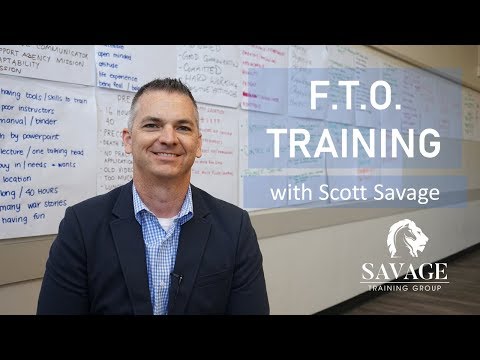Field Training Officer: Job Description & Salary

Field Training Officer Job Description Template
Field Training Officer Job Description A Field Training Officer (FTO) is a highly trained and experienced law enforcement professional who is responsible for training and mentoring new recruits in the field. The main role of an FTO is to provide guidance, support, and hands-on training to new officers during their probationary period. The responsibilities of an FTO include assessing the skills and abilities of new officers, providing feedback and evaluations, and developing individualized training plans to address any areas of improvement. They are responsible for teaching new officers the department’s policies and procedures, as well as the laws and regulations they need to enforce. One important aspect of an FTO’s role is to serve as a role model and exemplify the highest standards of professionalism, integrity, and ethics. They must demonstrate proper techniques and tactics in various law enforcement scenarios, and instill in new officers the importance of community-oriented policing and building positive relationships with the community. Another crucial aspect of being an FTO is ensuring the safety and well-being of new officers. FTOs must provide guidance on officer safety, including how to handle potentially dangerous situations and make split-second decisions. In summary, a Field Training Officer plays a vital role in shaping the next generation of law enforcement officers. They must possess exceptional leadership skills, be knowledgeable about law enforcement practices, and have the ability to effectively train and mentor new recruits to ensure they are prepared for the challenges they will face in their careers.Field Training Officer Responsibilities
Field Training Officer Requirements
How Much Does A Field Training Officer Make?
Field Training Officer Salary
| Rank | Salary Range |
|---|---|
| Field Training Officer I | $40,000 – $50,000 |
| Field Training Officer II | $50,000 – $60,000 |
| Field Training Officer III | $60,000 – $70,000 |
| Field Training Officer IV | $70,000 – $80,000 |
| Field Training Officer V | $80,000 – $90,000 |
A Field Training Officer (FTO) is a law enforcement professional who is responsible for training and mentoring newly hired officers. They play a crucial role in shaping the skills and knowledge of these recruits, ensuring they become effective and competent officers. The salary range for FTOs varies based on their rank, with higher ranks typically earning higher salaries. This table provides an overview of the salary ranges for different FTO ranks. It’s important to note that these figures may vary depending on factors such as location, years of experience, and department budget.
Field Training Officer Salaries by Country
Top Paying Countries for Field Training Officer
| Country | Average Salary (USD) |
|---|---|
| United States | $60,000 |
| Australia | $54,000 |
| Switzerland | $52,000 |
| Norway | $50,000 |
| Canada | $48,000 |
A Field Training Officer is an important role in law enforcement agencies, responsible for training and mentoring new recruits. The salary of a Field Training Officer can vary significantly depending on the country they work in. According to available data, the top paying countries for Field Training Officers are the United States, Australia, Switzerland, Norway, and Canada. In the United States, the average salary for a Field Training Officer is $60,000 per year, making it the highest paying country for this profession. Australia and Switzerland follow closely behind with average salaries of $54,000 and $52,000, respectively. Norway and Canada also offer competitive salaries for Field Training Officers, with average earnings of $50,000 and $48,000, respectively. It’s important to note that these figures are approximate and can vary based on factors such as experience, location, and agency budget.
A video on the topic Field Training Officer
Video Source : Savage Training GroupInterview Questions for Field Training Officer
1. Can you tell us about your experience as a Field Training Officer?
I have been working as a Field Training Officer for the past five years. During this time, I have trained and mentored numerous new recruits, helping them develop the necessary skills and knowledge to become successful in their roles.
2. What qualities do you believe are essential for a successful Field Training Officer?
I believe that a successful Field Training Officer should have strong leadership abilities, excellent communication skills, patience, adaptability, and the ability to provide constructive feedback. It is also important to have a thorough understanding of the job requirements and be able to effectively teach and demonstrate these skills to new recruits.
3. How do you ensure that new recruits are properly trained and prepared for their job responsibilities?
I follow a structured training program that includes both theoretical and practical components. I provide new recruits with comprehensive training materials, conduct hands-on training sessions, and closely supervise their performance during their initial days on the job. I also encourage open communication and address any questions or concerns that new recruits may have.
4. How do you handle difficult or challenging trainees?
When dealing with difficult or challenging trainees, I try to identify the underlying issues or reasons for their behavior. I maintain a calm and patient approach, offering constructive feedback and guidance. I also involve the trainee in setting achievable goals and offer additional support or resources if needed. If necessary, I consult with my superiors or HR department for further assistance.
5. How do you evaluate the progress and performance of trainees?
I use a combination of methods to evaluate the progress and performance of trainees. This includes regular assessments, observation of their skills during practical exercises, feedback from colleagues and supervisors, and self-evaluations. I provide clear and specific feedback, highlighting areas of improvement and acknowledging their strengths.
6. How do you keep yourself updated with the latest industry practices and training techniques?
I regularly attend workshops, conferences, and seminars related to my field. I am an active member of professional organizations where I can network with other professionals and exchange best practices. I also stay updated through reading industry publications and online resources.
7. Can you describe a situation where you had to adapt your training methods to meet the needs of a trainee?
During one training session, I had a trainee who was struggling to grasp a particular concept. Instead of sticking to my usual teaching method, I adapted my approach by incorporating visual aids and real-life examples to make the concept more relatable. This change helped the trainee understand the concept better and improve their performance.
8. How do you handle conflicts or disagreements between trainees?
When conflicts or disagreements arise between trainees, I encourage open communication and active listening. I try to understand the root cause of the conflict and facilitate a constructive discussion where both parties can express their perspectives. I help them find common ground and work towards a resolution that is mutually beneficial.
9. What steps do you take to ensure a positive and inclusive learning environment for trainees?
I create a positive and inclusive learning environment by treating all trainees with respect and dignity. I encourage collaboration and teamwork, fostering an atmosphere where everyone feels comfortable sharing their thoughts and ideas. I also address any discriminatory behavior promptly and ensure that diversity and inclusion are celebrated and respected.
10. How do you handle trainees who are not meeting the required standards?
If a trainee is not meeting the required standards, I first assess if there are any underlying issues affecting their performance. I offer additional support and guidance, providing them with resources or additional training if necessary. If the trainee continues to struggle despite these efforts, I may document their performance issues and involve my superiors or HR department to determine the appropriate course of action.






